What is Web Development? | Types of web developers

Web development refers to the process of building and maintaining websites and web applications. It encompasses a wide range of tasks, from designing the layout and visual elements of a website to programming its functionality and ensuring its compatibility across different devices and browsers.
What you’ll learn in this guide:
- What is web development?
- Types of web developers
- Web developer tasks and responsibilities
- Web developer career path
- How much do web developers make?
- How to become a web developer
- Build web developer skills
- Key Soft Skills for Web Developers
- Key Hard Skills for Web Developers
- Similar Specializations and Career Paths
What is Web Development?

Understanding the Concept
Web development is a multifaceted discipline that involves the creation and maintenance of websites and web applications. It encompasses a diverse set of skills and technologies aimed at bringing ideas to life on the internet.
Evolution of Web Development
- Early Days: Web development traces its roots back to the early days of the internet when static web pages were hand-coded using HTML.
- Dynamic Web: With the advent of technologies like JavaScript and server-side scripting, web pages became more dynamic, enabling interactive features and real-time updates.
- Modern Era: Today, web development has evolved significantly, with the introduction of robust frameworks, content management systems (CMS), and cloud-based services, enabling developers to create sophisticated web applications with ease.
Key Components of Web Development
- Front-End Development:
- Involves creating the user interface and client-side functionality of a website or web application.
- Utilizes languages such as HTML, CSS, and JavaScript.
- Focuses on enhancing user experience and visual appeal.
- Back-End Development:
- Deals with the server-side logic and database management of a web application.
- Involves programming languages like PHP, Python, Ruby, and frameworks like Node.js and Django.
- Ensures data integrity, security, and efficient server-side processing.
- Full-Stack Development:
- Combines both front-end and back-end development skills.
- Enables developers to work on all aspects of a project, from designing interfaces to implementing server logic.
- Requires proficiency in a wide range of technologies and frameworks.
Importance of Web Development
- Global Reach: Websites and web applications have a global reach, allowing businesses and individuals to connect with audiences worldwide.
- Business Growth: An effective online presence is essential for businesses to attract customers, showcase products or services, and drive revenue.
- Innovation: Web development drives innovation by enabling the creation of new technologies, platforms, and digital experiences.
The Role of Web Developers
- Problem Solvers: Web developers solve complex problems by translating ideas into functional and user-friendly web solutions.
- Continuous Learners: They stay updated with the latest technologies and trends in web development to deliver cutting-edge solutions.
- Collaborators: Web developers often work in teams, collaborating with designers, marketers, and project managers to achieve project goals.
Future Trends in Web Development
- Progressive Web Apps (PWAs): The rise of PWAs offers a more app-like experience on the web, combining the best of web and mobile app technologies.
- Responsive Design: With the increasing use of mobile devices, responsive design ensures optimal viewing and interaction across various screen sizes.
- Artificial Intelligence (AI): AI-powered web applications are becoming more prevalent, offering personalized experiences and automated functionalities.
Types of Web Developers
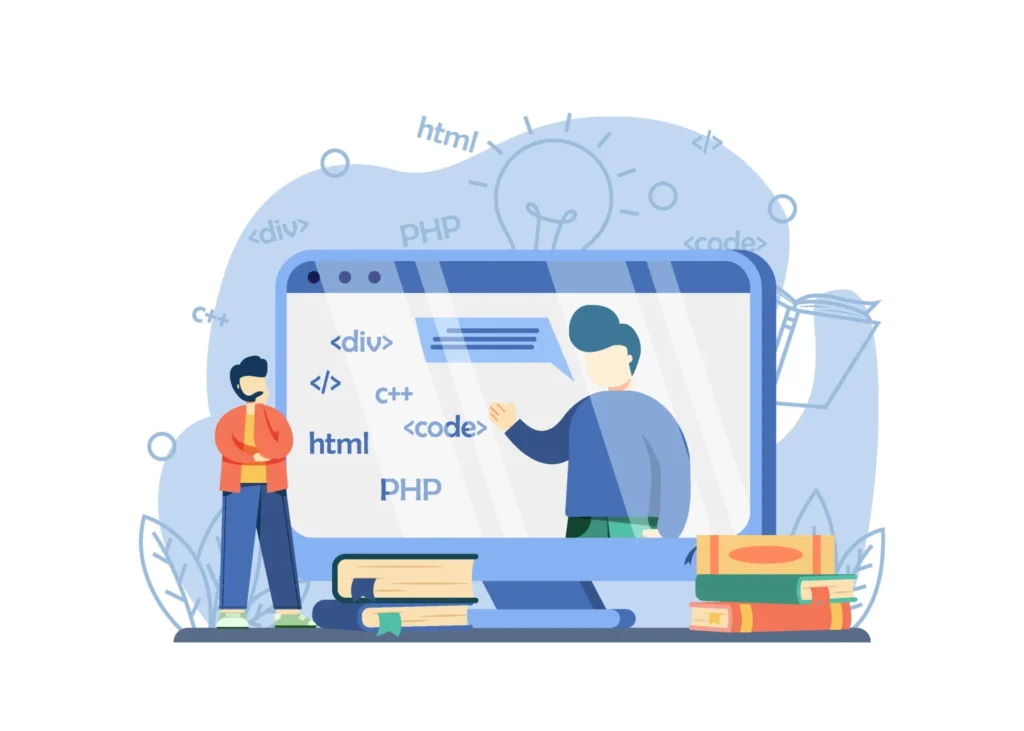
Understanding the Landscape
Web development encompasses a diverse range of roles and specializations, each focusing on different aspects of the development process and requiring distinct skill sets.
Front-End Developers
Overview
Front-end developers, also known as client-side developers, specialize in building the user-facing components of websites and web applications.
Responsibilities
- User Interface (UI) Design: Designing visually appealing and user-friendly interfaces using HTML, CSS, and JavaScript.
- Interactivity: Implementing interactive features and animations to enhance user engagement.
- Cross-Browser Compatibility: Ensuring that websites render consistently across different web browsers and devices.
Technologies
- HTML: Markup language for structuring web content.
- CSS: Stylesheet language for styling web pages.
- JavaScript: Programming language for adding interactivity and dynamic behavior.
Back-End Developers
Overview
Back-end developers focus on server-side programming and database management to ensure the functionality and performance of web applications.
Responsibilities
- Server-Side Logic: Writing code that runs on the server to process requests, handle data, and generate dynamic content.
- Database Management: Designing and maintaining databases to store and retrieve information efficiently.
- Security: Implementing measures to protect web applications from security threats and vulnerabilities.
Technologies
- Programming Languages: Such as PHP, Python, Ruby, Java, and C#.
- Frameworks: Like Node.js, Django, Flask, Ruby on Rails, and ASP.NET.
- Databases: Such as MySQL, PostgreSQL, MongoDB, and SQL Server.
Full-Stack Developers
Overview
Full-stack developers possess expertise in both front-end and back-end development, allowing them to work on all aspects of a project.
Responsibilities
- End-to-End Development: Handling both client-side and server-side development tasks within a single project.
- System Architecture: Designing the overall structure and architecture of web applications for scalability and performance.
- Integration: Ensuring seamless integration between front-end and back-end components for cohesive functionality.
Technologies
- Full-stack developers are proficient in a wide range of technologies, frameworks, and tools used in both front-end and back-end development.
Specialized Roles
DevOps Engineers
DevOps engineers focus on streamlining the development, deployment, and operation of web applications through automation and collaboration.
UI/UX Designers
UI/UX designers specialize in creating intuitive and visually appealing user interfaces, as well as optimizing user experience for web applications.
Mobile App Developers
Mobile app developers extend their web development skills to create native or hybrid mobile applications for iOS and Android platforms.
Web Developer Tasks and Responsibilities

Understanding the Role
Web developers play a crucial role in designing, building, and maintaining websites and web applications. Their tasks and responsibilities vary depending on their specialization and the specific requirements of the project.
Designing
User Interface (UI) Design
- Layout Design: Creating the structure and layout of web pages to ensure intuitive navigation and visual appeal.
- Visual Elements: Incorporating graphics, images, and multimedia elements to enhance the overall design aesthetic.
- Responsive Design: Ensuring that websites are optimized for various screen sizes and devices through responsive design techniques.
User Experience (UX) Design
- User Research: Conducting user research to understand user needs, preferences, and behaviors.
- Wireframing and Prototyping: Creating wireframes and prototypes to visualize the user interface and gather feedback early in the design process.
- Usability Testing: Conducting usability tests to identify and address usability issues and improve the overall user experience.
Programming
Front-End Development
- HTML/CSS Coding: Writing HTML and CSS code to create the structure, layout, and styling of web pages.
- JavaScript Development: Implementing client-side functionality and interactivity using JavaScript and related libraries and frameworks.
- Cross-Browser Compatibility: Ensuring that web pages render consistently across different web browsers and devices.
Back-End Development
- Server-Side Programming: Writing server-side code to handle requests, process data, and interact with databases.
- Database Management: Designing and maintaining databases to store and retrieve data efficiently.
- Security Implementation: Implementing security measures to protect web applications from common threats and vulnerabilities.
Testing and Debugging
Testing
- Functional Testing: Verifying that all features and functionalities of a web application work as intended.
- Compatibility Testing: Checking the compatibility of web applications across different browsers, devices, and operating systems.
- Performance Testing: Assessing the performance of web applications and optimizing them for speed and responsiveness.
Debugging
- Identifying Bugs: Using debugging tools and techniques to identify and diagnose issues within web applications.
- Fixing Errors: Resolving bugs and errors in code to ensure the smooth functioning of web applications.
- Optimizing Code: Optimizing code for efficiency, readability, and maintainability to facilitate future updates and enhancements.
Deployment and Maintenance
Deployment
- Web Server Configuration: Configuring web servers and hosting environments for deploying web applications.
- Version Control: Using version control systems like Git to manage and track changes to code during development and deployment.
- Deployment Automation: Implementing automated deployment pipelines to streamline the deployment process and reduce manual errors.
Maintenance
- Content Updates: Updating content, images, and other multimedia elements to keep web applications current and relevant.
- Security Patches: Applying security patches and updates to protect web applications against emerging threats and vulnerabilities.
- Performance Optimization: Monitoring and optimizing the performance of web applications to ensure fast loading times and smooth user experiences.
Web Developer Career Path
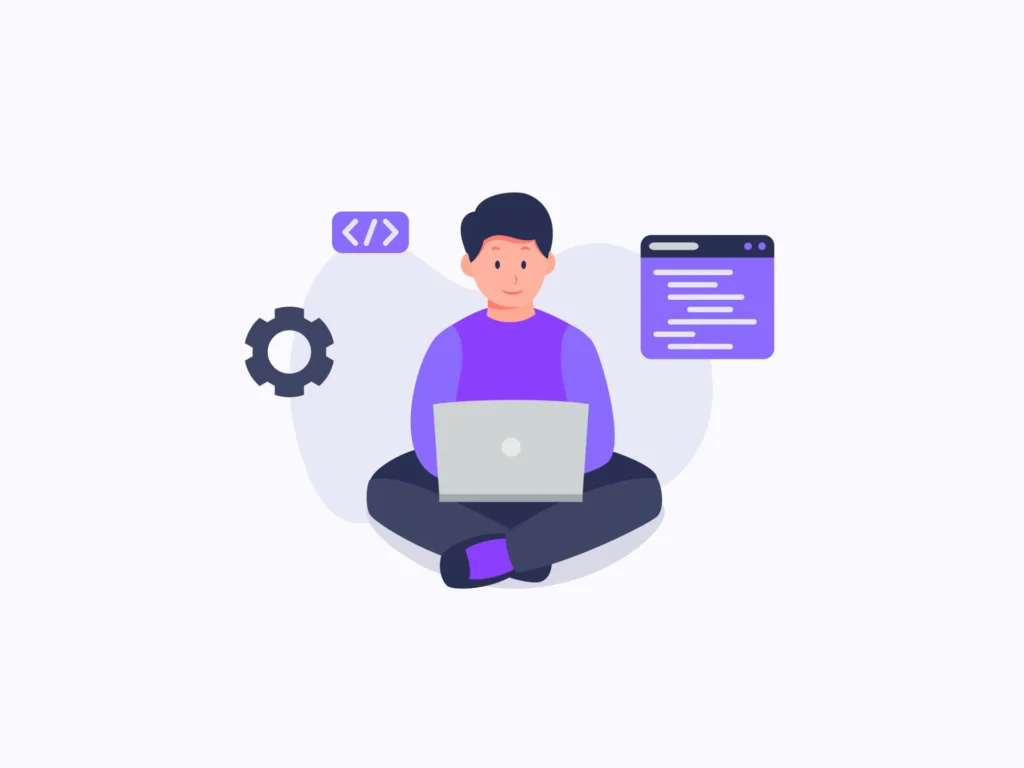
Navigating the Journey
The career path of a web developer is marked by continuous learning, skill development, and professional growth. From entry-level positions to senior roles, web developers progress through various stages in their careers, each presenting new challenges and opportunities for advancement.
Entry-Level Developer
Getting Started
- Education: Many entry-level web developers have a degree in computer science, information technology, or a related field. However, formal education is not always necessary, as self-taught developers can also enter the field through bootcamps, online courses, or practical experience.
- Internships and Junior Positions: Entry-level developers often start with internships or junior positions, where they gain hands-on experience and learn from experienced mentors.
Responsibilities
- Learning the Basics: Acquiring foundational knowledge in HTML, CSS, JavaScript, and other essential technologies.
- Assisting Senior Developers: Supporting senior developers in various tasks, such as coding, testing, and debugging.
Junior Developer
Progressing in the Role
- Skill Development: Junior developers focus on honing their technical skills and expanding their knowledge of web development frameworks, tools, and best practices.
- Taking on More Responsibility: As they gain experience, junior developers take on more significant tasks and projects under supervision, gradually transitioning to more independent work.
Responsibilities
- Project Contributions: Contributing to the development of web applications, including coding, testing, and troubleshooting.
- Continuous Learning: Actively seeking opportunities for learning and growth through online courses, workshops, and self-study.
Mid-Level Developer
Advancing in the Field
- Specialization: Mid-level developers may choose to specialize in specific areas of web development, such as front-end, back-end, or full-stack development.
- Leadership Opportunities: They may also take on leadership roles within development teams, mentoring junior developers, and guiding project direction.
Responsibilities
- Project Leadership: Leading development projects, from planning and design to implementation and deployment.
- Technical Expertise: Demonstrating proficiency in advanced web development concepts, tools, and techniques.
Senior Developer
Reaching the Pinnacle
- Mastery of Skills: Senior developers have a deep understanding of web development principles and technologies, as well as extensive experience in executing complex projects.
- Strategic Contributions: They play a strategic role in decision-making, architecture design, and technology adoption within their organizations.
Responsibilities
- Technical Leadership: Providing technical leadership and guidance to development teams, setting coding standards, and reviewing code.
- Problem Solving: Solving complex technical challenges and optimizing web applications for performance, scalability, and security.
Career Growth Opportunities
Specializations and Leadership Roles
- Technical Architect: Specializing in system architecture design and guiding the implementation of large-scale web projects.
- Engineering Manager: Transitioning into a managerial role, overseeing development teams, project timelines, and resource allocation.
Entrepreneurship and Freelancing
- Startup Founder: Launching a tech startup or founding a web development agency to pursue entrepreneurial ventures.
- Freelance Developer: Offering web development services independently, working with clients on a project basis.
How Much Do Web Developers Make?

Exploring Salary Trends
Web development is a lucrative field with salaries varying based on factors such as experience, location, specialization, and industry demand. Understanding the salary landscape can provide insight into earning potential and career progression for web developers.
Factors Influencing Salary
Experience
- Entry-Level: Entry-level web developers typically earn lower salaries as they gain experience and establish themselves in the field.
- Mid-Level: Mid-level developers with several years of experience command higher salaries, reflecting their expertise and proficiency.
- Senior-Level: Senior developers, with extensive experience and leadership skills, often earn the highest salaries in the field.
Location
- Urban vs. Rural: Salaries for web developers tend to be higher in urban areas with a high demand for tech talent and a higher cost of living.
- Regional Disparities: There may be significant disparities in salaries between different regions or countries, influenced by local economic conditions and industry demand.
Specialization
- Front-End vs. Back-End: Salaries may vary based on specialization, with some roles, such as full-stack development or specialized technologies, commanding higher compensation.
- Industry Demand: High-demand skills or emerging technologies may result in higher salaries due to limited supply and increased competition for talent.
Average Salary Ranges
United States
- Median Salary: In the United States, the median annual salary for web developers is around $73,760, according to recent data.
- Entry-Level: Entry-level web developers can expect to earn starting salaries ranging from approximately $50,000 to $60,000 per year.
- Senior-Level: Senior developers with extensive experience and expertise may earn salaries exceeding $100,000 per year.
Global Trends
- Regional Variations: Salaries for web developers vary significantly across different regions and countries, with some areas offering higher compensation than others.
- Cost of Living Adjustments: Salaries may be adjusted based on the cost of living in a particular region, with higher salaries in areas with a higher cost of living.
Salary Growth Potential
Career Progression
- Continuous Learning: Web developers can increase their earning potential by acquiring new skills, certifications, and advanced degrees.
- Specialization: Specializing in high-demand areas or emerging technologies can lead to increased job opportunities and higher salaries.
- Leadership Roles: Transitioning into leadership roles, such as team lead or technical architect, can result in higher compensation and greater responsibility.
How to Become a Web Developer
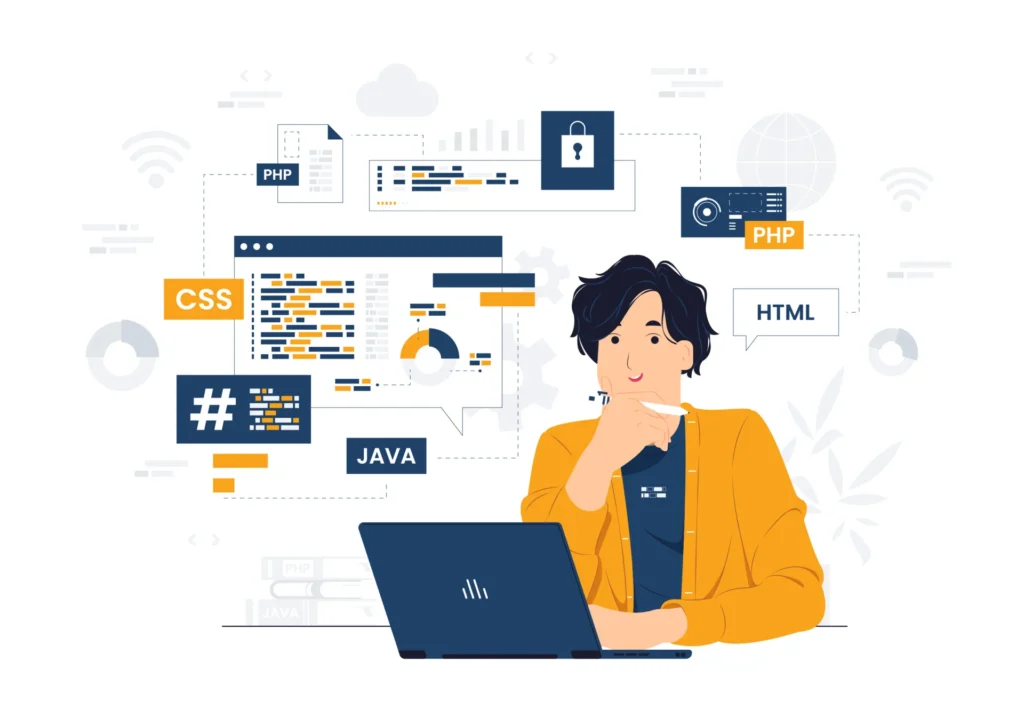
Embarking on the Journey
Becoming a web developer is an achievable goal with the right combination of education, practical experience, and continuous learning. Whether you’re starting from scratch or transitioning from another career, here’s a roadmap to help you become a successful web developer.
1. Learn the Basics
Self-Study or Formal Education
- Online Resources: Explore online tutorials, courses, and resources available on platforms like Codecademy, Udemy, and freeCodeCamp to learn HTML, CSS, and JavaScript.
- Bootcamps: Consider enrolling in a coding bootcamp to gain intensive, hands-on training in web development skills within a short timeframe.
2. Choose a Specialization
Front-End, Back-End, or Full-Stack
- Front-End Development: Focus on designing and developing the visual aspects of websites and web applications using HTML, CSS, and JavaScript.
- Back-End Development: Learn server-side programming languages like Python, PHP, or Node.js to build the underlying logic and functionality of web applications.
- Full-Stack Development: Master both front-end and back-end technologies to work on all aspects of web development projects.
3. Build Projects
Hands-On Experience
- Personal Projects: Start building your own websites, portfolios, or web applications to apply and reinforce your newly acquired skills.
- Freelance Work: Take on freelance projects or internships to gain real-world experience and build your portfolio.
4. Gain Experience
Internships or Entry-Level Positions
- Internships: Apply for internships at tech companies or web development agencies to gain valuable industry experience and mentorship.
- Entry-Level Positions: Seek entry-level positions such as junior web developer or web development assistant to kickstart your career in the field.
5. Continuous Learning
Stay Updated with Industry Trends
- Online Courses: Enroll in advanced courses or workshops to deepen your knowledge of specific technologies, frameworks, or emerging trends in web development.
- Networking: Connect with other web developers, attend meetups, conferences, and online communities to stay informed about the latest industry developments.
6. Specialize and Advance
Advanced Skills and Certifications
- Specializations: Consider specializing in areas such as UI/UX design, mobile app development, or DevOps to expand your skill set and career opportunities.
- Certifications: Pursue industry-recognized certifications, such as AWS Certified Developer or Google Developer Certification, to validate your expertise and stand out in the job market.
7. Build a Strong Portfolio
Showcase Your Work
- Portfolio Projects: Continuously update and expand your portfolio with new projects, showcasing your skills, creativity, and problem-solving abilities.
- Case Studies: Provide detailed case studies or descriptions of your projects, highlighting your contributions and the technologies used.
8. Job Search and Career Growth
Finding Opportunities
- Job Boards: Explore job boards like LinkedIn, Indeed, and Stack Overflow to search for web developer positions that match your skills and experience.
- Networking: Leverage your professional network, attend career fairs, and reach out to potential employers to explore job opportunities.
Build Web Developer Skills
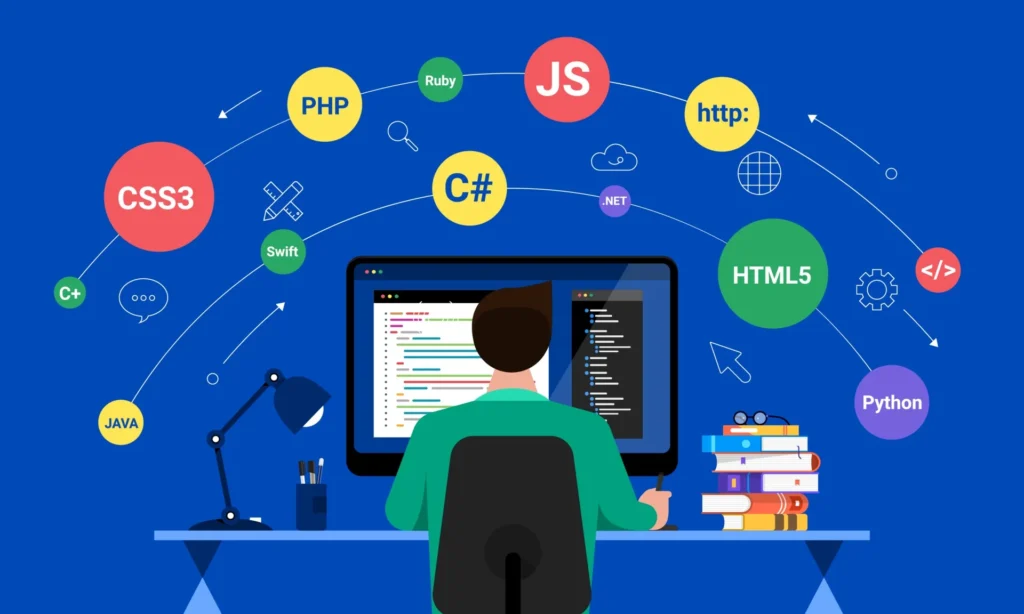
Cultivating Expertise
Developing a diverse set of skills is essential for success in the field of web development. From technical proficiencies to soft skills, here’s a comprehensive guide to building the skills needed to thrive as a web developer.
1. Technical Skills
Front-End Development
- HTML: Master the fundamentals of Hypertext Markup Language (HTML) to create the structure and content of web pages.
- CSS: Gain proficiency in Cascading Style Sheets (CSS) to style and format the layout, design, and visual elements of web pages.
- JavaScript: Learn JavaScript programming to add interactivity, dynamic behavior, and client-side functionality to web applications.
Back-End Development
- Server-Side Languages: Acquire proficiency in server-side programming languages such as Python, Ruby, PHP, or Node.js to handle server logic and data processing.
- Databases: Understand database management systems like MySQL, PostgreSQL, MongoDB, or SQL Server for storing and retrieving data in web applications.
- Frameworks and Libraries: Familiarize yourself with popular web development frameworks and libraries such as React, Angular, Vue.js, Express.js, or Flask to streamline development and enhance productivity.
2. Problem-Solving Skills
Analytical Thinking
- Critical Thinking: Develop the ability to analyze complex problems, identify root causes, and formulate effective solutions.
- Problem-Solving Strategies: Practice breaking down problems into smaller, manageable components and applying systematic problem-solving strategies to address them.
Debugging Techniques
- Debugging Tools: Learn how to use debugging tools and techniques to identify, isolate, and fix errors and bugs in code.
- Error Handling: Understand common error messages and debugging strategies to troubleshoot issues effectively during the development process.
3. Soft Skills
Communication
- Effective Communication: Cultivate strong verbal and written communication skills to articulate ideas, collaborate with team members, and communicate technical concepts to non-technical stakeholders.
- Active Listening: Practice active listening to understand client requirements, gather feedback, and address concerns effectively.
Collaboration
- Teamwork: Develop the ability to work collaboratively in a team environment, share knowledge, and contribute to collective goals.
- Conflict Resolution: Learn conflict resolution strategies to navigate disagreements and conflicts that may arise during project collaboration.
4. Continuous Learning
Stay Updated
- Industry Trends: Stay informed about the latest trends, technologies, and best practices in web development through blogs, forums, online courses, and industry publications.
- Professional Development: Invest in ongoing professional development by attending workshops, conferences, and training programs to expand your skill set and stay competitive in the job market.
5. Adaptability
Flexibility and Adaptation
- Adapt to Change: Embrace change and be open to learning new technologies, methodologies, and tools as the field of web development evolves.
- Agility: Develop the ability to adapt quickly to changing project requirements, client needs, and technological advancements.
Key Soft Skills for Web Developers
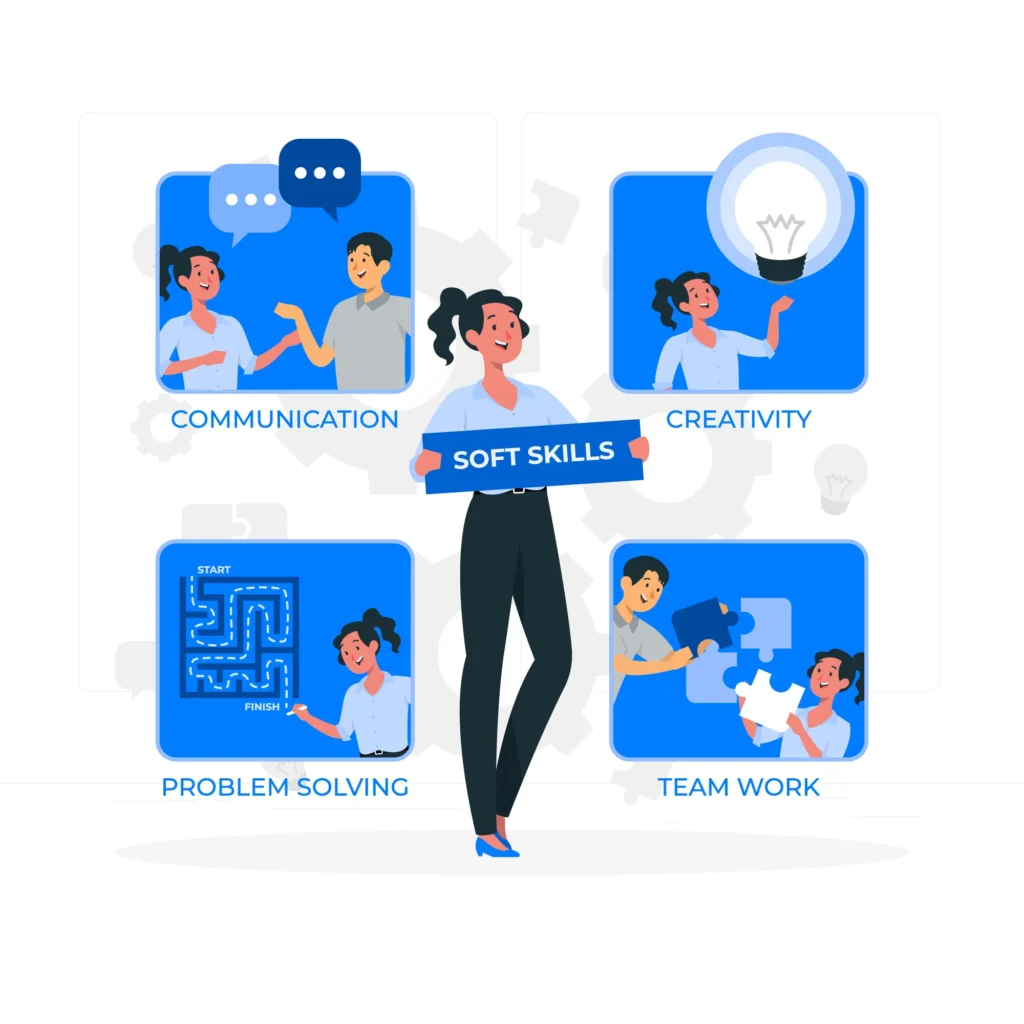
Nurturing Interpersonal Abilities
In addition to technical expertise, soft skills are essential for success as a web developer. These interpersonal skills enable effective collaboration, communication, and problem-solving in the dynamic world of web development.
1. Communication Skills
Verbal Communication
- Clarity: Articulate technical concepts and ideas clearly and concisely during team meetings, client discussions, and presentations.
- Active Listening: Demonstrate attentiveness and understanding by actively listening to colleagues, clients, and stakeholders to gather requirements and feedback accurately.
Written Communication
- Documentation: Write clear and comprehensive documentation for code, project plans, and technical specifications to facilitate collaboration and knowledge sharing.
- Email Etiquette: Maintain professional communication through clear and courteous email correspondence with team members, clients, and external stakeholders.
2. Collaboration and Teamwork
Team Dynamics
- Contribution: Collaborate effectively with team members by sharing ideas, providing feedback, and contributing to group discussions and decision-making processes.
- Flexibility: Adapt to different team dynamics, project requirements, and communication styles to foster a positive and productive working environment.
Conflict Resolution
- Mediation: Mediate conflicts and disagreements constructively by facilitating open communication, understanding diverse perspectives, and seeking mutually beneficial solutions.
- Problem-Solving: Use conflict resolution skills to address interpersonal conflicts and resolve issues that may arise within the team or with clients.
3. Time Management and Organization
Prioritization
- Task Management: Prioritize tasks effectively by identifying critical deadlines, dependencies, and project milestones to ensure timely delivery of work.
- Time Allocation: Allocate time efficiently to different tasks and projects, balancing competing priorities and managing workload effectively.
Organization
- Workflow Management: Maintain an organized workflow by setting up project management systems, tracking progress, and keeping documentation up-to-date for easy reference.
- File Management: Organize files, assets, and code repositories systematically to streamline collaboration, version control, and project maintenance.
4. Adaptability and Learning Agility
Flexibility
- Adapt to Change: Embrace changes in project scope, technology stack, or client requirements with resilience and a positive attitude, adjusting plans and strategies as needed.
- Learning Orientation: Cultivate a growth mindset and a passion for continuous learning, staying updated with new technologies, trends, and best practices in web development.
Problem-Solving
- Creative Solutions: Approach challenges and obstacles with creativity and resourcefulness, exploring innovative solutions and alternative approaches to overcome technical or logistical hurdles.
- Critical Thinking: Apply critical thinking skills to analyze problems, evaluate options, and make informed decisions that contribute to effective problem-solving and project success.
Key Hard Skills for Web Developers
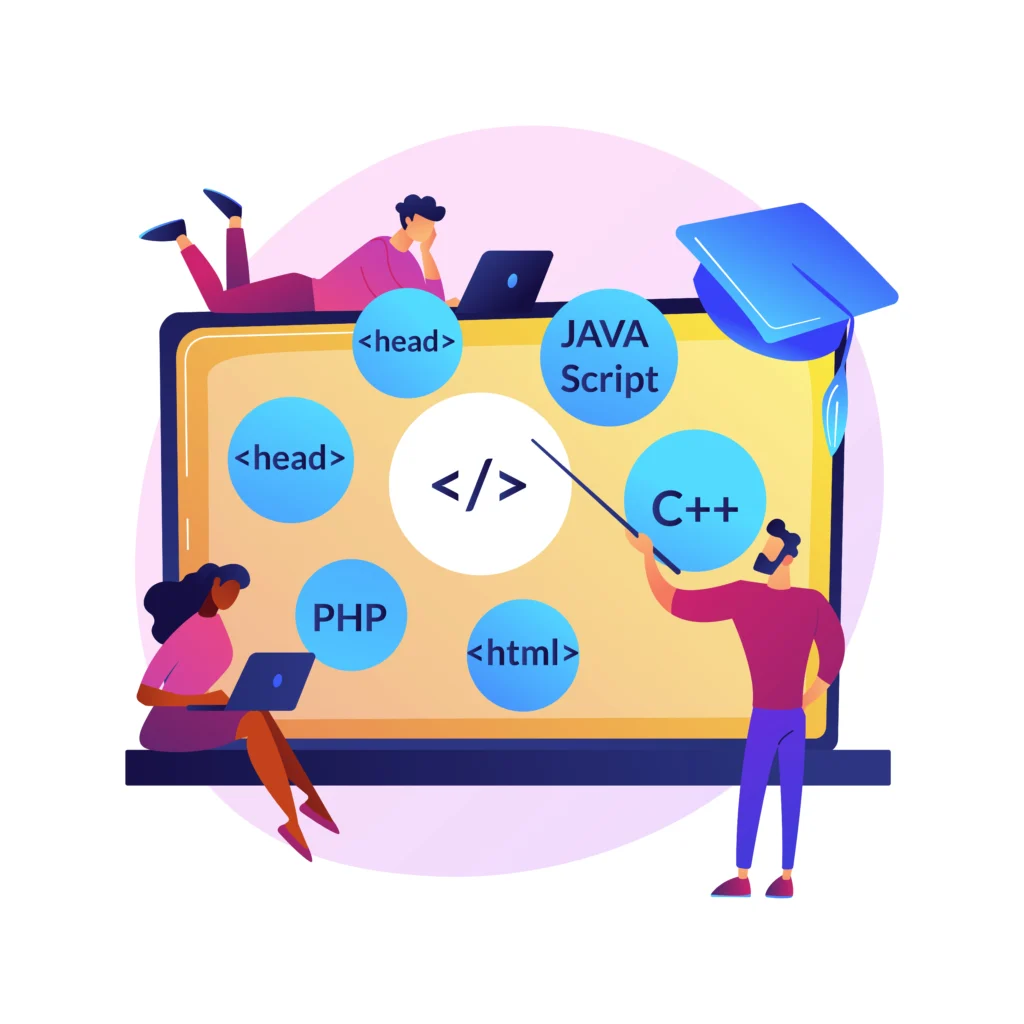
Mastering Technical Competencies
Hard skills are the technical abilities and proficiencies that enable web developers to design, build, and maintain websites and web applications. These skills encompass programming languages, frameworks, tools, and technologies essential for success in the field of web development.
1. Front-End Development
HTML (HyperText Markup Language)
- Semantic Markup: Understand the principles of semantic HTML and use appropriate tags to structure web content for accessibility, SEO, and maintainability.
- Forms and Input Elements: Create forms and input elements using HTML to collect user data, validate inputs, and submit form submissions to server-side scripts.
CSS (Cascading Style Sheets)
- Styling Techniques: Apply CSS styles to HTML elements to control layout, typography, colors, and visual aspects of web pages, ensuring consistency and responsiveness across different devices.
- CSS Frameworks: Familiarize yourself with CSS frameworks such as Bootstrap, Foundation, or Bulma to expedite front-end development and leverage pre-designed components and styles.
JavaScript
- Programming Fundamentals: Master the fundamentals of JavaScript, including variables, data types, operators, control structures, functions, and object-oriented programming concepts.
- DOM Manipulation: Manipulate the Document Object Model (DOM) using JavaScript to dynamically update content, handle user interactions, and create interactive web experiences.
2. Back-End Development
Server-Side Languages
- Node.js: Learn server-side JavaScript programming with Node.js to build scalable and high-performance web applications using non-blocking, event-driven architecture.
- Python: Explore Python as a versatile and beginner-friendly language for back-end development, with popular frameworks like Django and Flask for building robust web applications.
Databases
- Relational Databases: Understand relational database concepts and SQL (Structured Query Language) to design, query, and manage data in relational database management systems (RDBMS) like MySQL, PostgreSQL, or SQL Server.
- NoSQL Databases: Familiarize yourself with NoSQL databases like MongoDB, Firebase, or Cassandra for handling unstructured or semi-structured data in web applications.
Web Servers and APIs
- HTTP Protocol: Gain a solid understanding of the Hypertext Transfer Protocol (HTTP) and RESTful API design principles for building web services and integrating third-party APIs into web applications.
- Server-Side Frameworks: Explore server-side frameworks like Express.js (for Node.js), Django, Flask, or Ruby on Rails to streamline back-end development and handle routing, middleware, authentication, and data persistence.
3. Version Control and Deployment
Version Control Systems
- Git: Master Git version control system for tracking changes, collaborating with team members, managing branches, and facilitating code review and collaboration in web development projects.
- GitHub/GitLab/Bitbucket: Utilize online platforms like GitHub, GitLab, or Bitbucket for hosting code repositories, managing project workflows, and collaborating with distributed development teams.
Deployment and DevOps
- Deployment Strategies: Learn various deployment strategies such as continuous integration/continuous deployment (CI/CD), containerization (Docker), and serverless architectures for deploying web applications to production environments.
- Infrastructure as Code (IaC): Explore infrastructure automation tools like Terraform or AWS CloudFormation for provisioning, managing, and scaling cloud infrastructure resources in web development projects.
Similar Specializations and Career Paths

Exploring Alternative Routes
While web development offers a rewarding career path, there are several related specializations and career paths that individuals with web development skills may consider pursuing. These alternative routes leverage similar skill sets and provide opportunities for growth and specialization within the broader field of technology.
1. Mobile App Development
Overview
Mobile app development involves designing, building, and maintaining applications for mobile devices such as smartphones and tablets.
Skills Transferable from Web Development
- Programming Languages: Proficiency in languages like JavaScript, Java, Swift, or Kotlin, which are used for mobile app development.
- UI/UX Design: Understanding of user interface (UI) and user experience (UX) design principles, which apply to both web and mobile interfaces.
Career Opportunities
- iOS Developer: Specialize in developing native iOS applications for Apple devices using technologies like Swift and Xcode.
- Android Developer: Focus on building native Android applications using Java or Kotlin, Android Studio, and related frameworks.
2. UI/UX Design
Overview
UI/UX design focuses on creating intuitive, visually appealing user interfaces and optimizing user experiences for web and mobile applications.
Skills Transferable from Web Development
- Front-End Development: Understanding of HTML, CSS, and JavaScript for implementing UI designs and interactive components.
- User-Centric Approach: Ability to empathize with users, understand their needs, and design interfaces that enhance usability and satisfaction.
Career Opportunities
- UI Designer: Specialize in designing visual interfaces, including layout, typography, color schemes, and graphical elements.
- UX Researcher: Conduct user research, usability testing, and analysis to identify user needs and inform design decisions.
3. DevOps Engineering
Overview
DevOps engineering focuses on streamlining the development, deployment, and operation of software applications through automation, collaboration, and continuous integration/continuous deployment (CI/CD) practices.
Skills Transferable from Web Development
- Version Control: Proficiency in using version control systems like Git for managing code repositories and facilitating collaboration.
- Deployment and Automation: Understanding of deployment strategies, infrastructure as code (IaC), and automation tools used in web development projects.
Career Opportunities
- DevOps Engineer: Specialize in automating deployment pipelines, configuring infrastructure, and implementing monitoring and alerting systems.
- Site Reliability Engineer (SRE): Focus on ensuring the reliability, availability, and performance of web applications through infrastructure optimization and proactive maintenance.
4. Technical Writing
Overview
Technical writing involves creating documentation, tutorials, and guides for software products and technologies to help users understand and use them effectively.
Skills Transferable from Web Development
- Clear Communication: Ability to communicate complex technical concepts in a clear and understandable manner.
- Documentation: Experience in writing technical documentation, such as API documentation, user guides, and tutorials for web applications.
Career Opportunities
- Technical Writer: Specialize in creating documentation for software products, including user manuals, API references, and developer guides.
- Content Developer: Focus on producing educational content, tutorials, and blog posts related to web development tools, technologies, and best practices.




Great breakdown! This article provides a comprehensive overview of web development, covering its essence and the various types of web developers involved in creating the digital landscape we interact with daily. It’s valuable for both newcomers looking to understand the field and seasoned professionals seeking to refresh their knowledge. Well done!